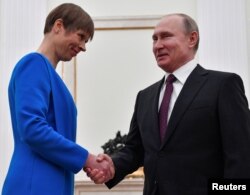As far-right nationalists look to expand their power in European Parliamentary elections taking place this weekend, Estonia’s president has some advice for politically embattled centrists: don’t blame Brussels for waning political support at home.
A once-shining example of democratic growth, progressive e-governance policies and a hotbed for start-ups and high-tech enterprise in the post-Soviet sphere, Estonia was faced with a groundswell of right-wing populism that rattled the centrist establishment when the Baltic nation’s far-right EKRE took 19 of 101 parliamentary posts in March elections.
The political tremors became a full-blown seismic shift just weeks later when Prime Minister Jüri Ratas invited the group, which has bashed immigrants, judges, journalists, and vowed to end same-sex marriage, to join a ruling coalition in order to safeguard his own position.
Since being elected to a five-year term in 2016, President Kersti Kaljulaid, the first woman and youngest person ever to hold the position, has watched a similar pattern unfold in other EU member states. Faced with an increasingly aggressive Russia, an isolated U.S., a refugee influx, terror attacks, a British move to abandon the bloc and an erratic recovery from the global financial crisis, chunks of the electorate are backing far-right or Euroskeptic groups that appear poised to make record parliamentary gains.
Voters pushed to fringe
But issues forcing voters to the fringe — particularly matters of national security and foreign policy — aren’t addressed by the 751-member legislature in Brussels, whose representatives can’t directly propose legislation and are instead tasked with ratifying EU treaties, free-trade agreements, and overseeing the EU’s $186 billion annual budget.
As members of the only directly elected EU institution, however, European representatives in Brussels are nonetheless targeted by voters frustrated with the status quo back home.
“Each country has their own reasons for why they see these kinds of movements, but there is one general characteristic ... that they have swaths of the population who feel that nobody represents them, and nobody has been speaking up for them for quite a long time,” Kaljulaid recently told VOA’s Russian Service.
“These are people who have seen the negative side effects of the great economic cooperation,” she added, referring to an increasingly globalized economy. “And it’s not Brussels’ fault or the European Union’s fault. As we all know, all the redistributive policies — in the wide sense, including education, health care and social services — are the responsibilities of member states themselves.”
If economic gains of a single European nation can be converted into domestic social services, then the average voter is less likely to demand radical change at the national or federal level, Kaljulaid said.
“We know there are lots of issues of intergenerational poverty globally, and these are people who feel that,” she said, adding that many on Europe’s political fringe feel that economic gains haven’t translated into a better life for their own families.
“So our work as politicians is not to tell them that ‘you are populists and you don’t get the way of Europe,’ or things like that,” she said. “Our job is to make sure that national redistributive mechanisms [ensure that] the gains reach people.
“The worst thing you can say [as a politician] is, ‘We’re doing everything right,’” she added. “As a politician, it’s a sign of strategic leadership to look for the pockets in the society where we are not doing things right.”
US-EU ties: A view from the Baltics
Asked about the status of Estonian-U.S. relations at a time when fellow European leaders such as former Finnish Prime Minster Jyrki Katainen have accused U.S. President Donald Trump of working with Russian President Vladimir Putin to weaken the EU, Kaljulaid remained optimistic.
“We have a rise of non-democratic countries who are actually gaining quite a lot of economic capacity globally, like China, and are becoming a strategic worry for our common, value-based world order,” she said. “We see that these countries are keen to dominate economically, and they are not ready to offer us guarantees that they will not use technology companies to gain unlawful information about our citizens.
“So there are other countries which do not respect international legal space as we would hope they would, like Russia, for example. But this actually makes [the EU and the U.S.] stick together, and the transatlantic bond is therefore a normality and it does exist and it is strong,” Kaljulaid added.
Despite U.S.-EU differences on Iran and trade issues, Kaljulaid described the relationship as “so strong that we can afford to argue.”
Even with “this current American administration,” she added, “nothing has shattered, everything’s in place, so we can afford to have trade discussions, differences of opinion about tactics on Iran, for example, but the foundation has not changed. And the relationship, if you will follow what is going on, is very close.”
Kaljulaid recently brushed off criticism about her trip to Moscow, where she was the first Baltic leader to meet with the Russian president in nearly a decade.
“Yes, I was there as president of Estonia but also as one of the presidents of the countries of the European Union who undertake the difficult task to go and talk about Ukraine and Georgia and these issues which we feel that need to be solved,” she said. “We talk a lot about Russia among ourselves, and I feel it’s only fair that that we go and talk directly to President Putin.”
Hundreds of millions of voters are eligible to cast ballots across the 28 member countries participating in the election, which takes place over the course of four days.
The last EU parliamentary elections, held in 2014, saw less than 43 percent of electorate casts votes, a number well below average turnout for national elections across Europe, which typically see turnouts of higher than 66 percent.
This story originated in VOA’s Russian Service.













